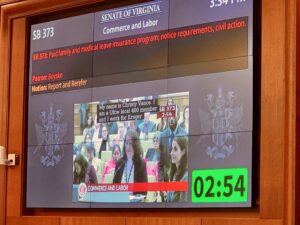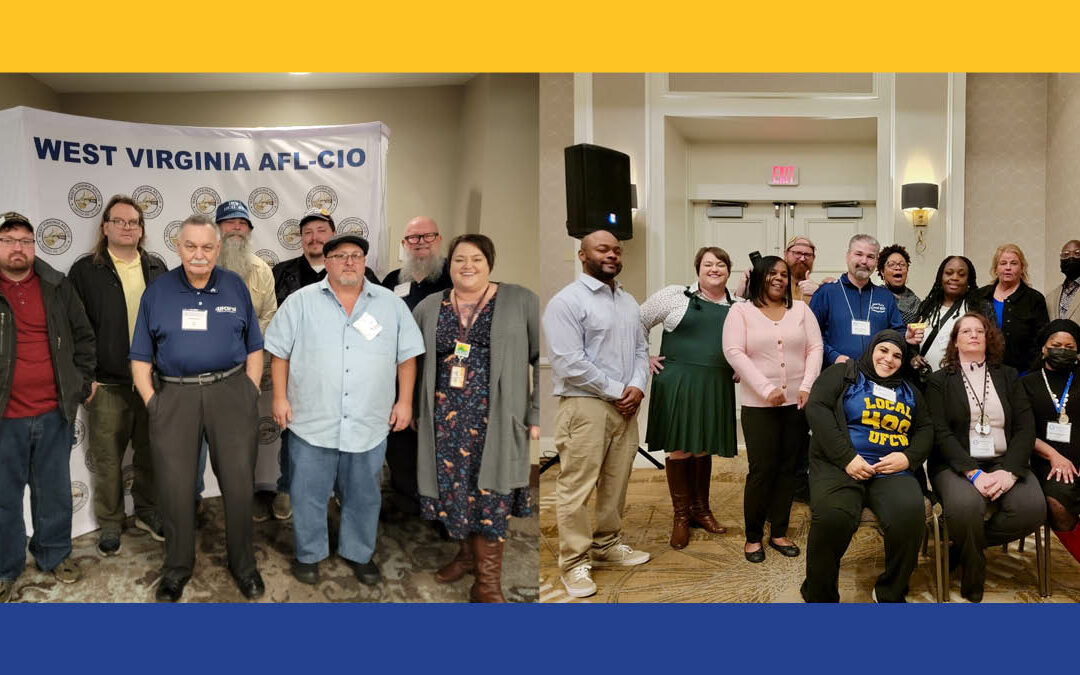Make Our Voices Heard in the Corridors of Power
Local 400 members from Virginia and West Virginia recently traveled to their state capitols to meet with their state legislators, give testimony, and urge action to improve our members’ lives.
Shop stewards Janet Wainwright (Kroger), Kristy Vance (Kroger) and Darawan Kenner (Omega Protein) attended Richmond Lobby Day. There, they advanced a wide-ranging agenda that includes raising the minimum wage to $15/hour, guaranteeing paid family and medical leave, covering repetitive motion injuries under workers’ compensation, adding a Labor Peace Agreement to the state’s cannabis law, and protecting Omega Fishermen from attack.
Stop stewards Mark Cordle (Kroger) and Jamie Andrick (Kroger) attended Charleston Lobby Day, where they talked with their representatives about the issues at stake in the West Virginia Kroger bargaining and urged them to look out for the well-being of Local 400 members.
Virginia
Janet Wainwright, who has participated in several Lobby Days, said the atmosphere in Richmond is very different from last year’s. “The Democrats are in control of the House now,” she noted. “Now, even the Republicans seem to want to talk and have an open mind. Last year, they were die-hard partisans. This year, there seems to be more openness that they would cross the aisle if it would help their constituents.”
Wainwright testified in favor of a bill that would allow members to deduct their union dues on their taxes. She also spoke to legislators about the importance of a $15/hour minimum wage and other priorities. “A $15 minimum wage would be a big plus because it will mean more money in our pockets when we negotiate our next contract this August,” she noted. “We’re also fighting to include repetitive motion injuries in workers’ comp and paid leave. This is an honest fight to get our members’ voices heard.”

UFCW Local 400 shop steward Kristy Vance testifies in support of legislation to provide paid sick and family leave for Virginians.
Kristy Vance also felt more receptiveness to Local 400 members’ views. “In the past, it felt as though legislators didn’t want to hear what we had to say,” she said. “This was different — on both sides. Some Democrats in past years felt more like Dixiecrats, but the new faces are much more welcoming. Unlike those who had been there before, they are now more open to standing with labor.”
Vance testified on behalf of legislation providing paid sick and family leave for Virginians. “I felt there was a different aura coming from the committee members,” she recalled. “They showed sincere interest in what we were saying. In the past, they would tend to look down at their phones or computers. So I feel optimistic that this legislature can get some good things done. Whether they’ll be signed by the governor, who knows? But if he vetoes the bills, we’ll fight to override them.”
For Darawan Kenner, this Lobby Day was a first. “It was really interesting,” he said. “I got to meet a lot of different people. They gave us the time to talk and took the time to listen.”
Kenner testified in favor of legislation that would toughen criminal penalties for attacks on commercial fishing vessels. “We have a very dangerous job,” he said. “It’s the second-most dangerous job in Virginia, behind logging. And we’re being hunted right now on the open water. We’ve been attacked with jet skis. Shots have been fired at us. It’s coming from recreational fishermen who think we’re hurting game fish, even though we catch menhaden, which is not a game fish. This is our livelihood — not our hobby — and right now, those who attack us only face a $500 fine. That needs to be toughened — and the waters we fish in need to be policed and prosecuted better. If not, someone’s going to lose their life as result.
“Lobby Day was a great experience,” Kenner said. “I learned a lot about the legislative process and what it takes to pass a bill. If any member has an opportunity to join Lobby Day, they should do it because it’s a way to make our voices heard.”
West Virginia
Mark Cordle’s Lobby Day visit to the state capitol in Charleston was his second. “It’s eye opening,” he said. “And it’s really important. Politics affects everything in our life including our contract with Kroger, which we’re bargaining now.
“Unfortunately, the West Virginia legislature is a very different place than it was before they passed ‘right to work,’” he noted. “West Virginia needs a workforce paid well enough to support the economy. There needs to be a middle class here because we’re dwindling down to nothing. It hurts. That’s the case I make to the legislators I meet.”
As a member of the Kroger Bargaining Committee, Cordle discussed the status of negotiations with state legislators and the stakes involved in the outcome. “If our representatives want to show they care about the standard of living in West Virginia, they ought to tell Kroger to give us a fair contract,” he said.
This was also Jamie Andrick’s second Lobby Day. “It was nice and laid back,” he said. “Most of the politicians I talked to were pleasant and welcoming and seemed to relate to our jobs and issues. It’s a good thing to be able to do that and connect to these delegates and senators.
“We talked about the Kroger contract coming up and trying to make sure that if it goes into any elongated bargaining that they would be favorable to our needs and realize that ultimately, what we do at store level goes to the greater good,” Andrick said. “We’ve recently had a lot of turnover and problems retaining employees, so some support from political figures would be handy in getting the corporations to realize that if we don’t put some more money into the pockets of our workers, we won’t be able to keep anybody.”
Andrick emphasized that these Lobby Days build connections that make a difference. “I was talking with Delegate Mickey Petitto and she realized that my father, who’s retired now, was her favorite meat cutter and she missed quality of his work,” he recalled. “I explained to her that it’s a skill and art form. Knowing my father helped her connect to our issues.”
Holding elected officials accountable
“Lobby Day is about holding our representatives accountable,” Wainwright said. “A lot of the time, they say they’re going to do one thing during the campaign and then once they’re elected, they do something else.”
She gave the example of state Sen. Aaron Rouse, who introduced bill on cannabis but left out a Labor Peace Agreement. “We pulled him aside and told him he left something important out,” she said. “He said, ‘I didn’t forget y’all and we’ll add it in later.’ Later on, we found out no, there was still no Labor Peace Agreement. We’re going to make sure he understands that we helped elect him, this is what we expect from him, and we will remember what he did and didn’t do.”
Another example is former state Sen. Monty Mason, who refused to back Local 400’s efforts to repeal Virginia’s “right to work” law. “We told him — and every candidate — that we would not support them if they weren’t with us on ‘right to work.’ And Monty Mason lost his re-election campaign. We showed that what you do has consequences,” Wainright said.
Andrick said, “I enjoy Lobby Day, I appreciate having the opportunity. It’s a good way for the common person to connect with their political representatives.”
Vance said that she always has a quote from the late UAW President Walter Reuther in the front of her mind when she goes to the state capitol: “There’s a direct relationship between the ballot box and the bread box, and what the union fights for and wins at the bargaining table can be taken away in the legislative halls.”
“I’m in the Roanoke Kroger contract,” she said. “When we got the state minimum wage increased in 2019, that had a direct connection with our 2020 contract. The wage floor was raised and everyone’s pay went up as a result. What we do here matters deeply.”
Wainwright noted, “Speaking for Local 400 carries some weight. It all starts with elections. We make sure our members are registered because we need the right people in office to pass the legislation we want. And then we lobby to make sure they deliver for us. It goes hand in hand.”

